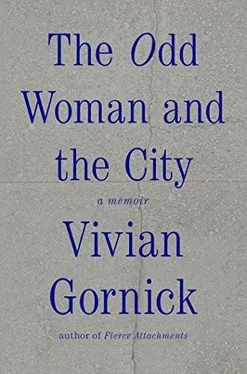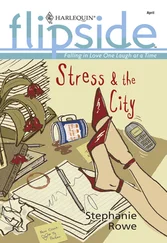One day he suggested that I let him sodomize me, something we’d not done before. I demurred. Next day he made the same suggestion. Again, I demurred. “How do you know you won’t like it,” he persisted, “if you’ve never done it?” He wore me down: I agreed to try it once. No, no, he said, I must agree to do it three times and then if I said no it would be no. So we did it three times, and truth to tell, I didn’t hate the physical sensation as much as I had thought I would — almost against my will, my body responded — but I definitely did not like it.
“Okay,” I said, “I’ve done it three times, and I don’t want to do it anymore.”
We were lying in bed. He nuzzled my neck and whispered in my ear, “C’mon. Just one more time. You know you like it.”
I drew away then and looked directly into his face. “No,” I said, and was startled by the finality in my own voice.
“What an unnatural woman you are!” he exploded at me. “You know you want to do it. I know you want to do it. Yet you fight it. Or is it me you’re fighting?”
Once again, I stared at him: only this stare was different from those other stares. A man was pressing me to do something I did not want to do, and pressing me in a manner he would never have applied to another man: by telling me that I didn’t know what I wanted. I felt my eyes narrowing and my heart going cold. For the first — but not the last — time, I consciously felt men to be members of a species separate from myself. Separate and foreign. It was as though an invisible membrane had fallen between me and my lover, one fine enough to be penetrated by desire but opaque enough to obscure human fellowship. The person on the other side of the membrane seemed as unreal to me as I felt myself to be to him. At that moment I didn’t care if I never again got into bed with a man.
I did of course get into bed with them — love, quarrel, and bliss out many more times after this man and I parted — but the memory of that fine, invisible separation haunted me; and more often than I like to remember, I saw it glistening as I gazed into the face of a man who loved me but was not persuaded that I needed what he needed to feel like a human being.
In time, I came to know other women who would have analyzed the experience differently but immediately understood what I was talking about when I described the invisible curtain. It comes with the territory, most of them said, shrugging. They had made their peace with an arrangement that was as it had ever been. I saw that I could not. For me, it had become the pea beneath the twenty mattresses: an irritation of the soul that I could not accommodate.
Work, I said to myself, work. If I worked, I thought, pressing myself against my newly hardened heart, I’d be a person in the world. What would it matter then that I was giving up “love”?
As it turned out, it mattered more than I had ever dreamed it would. As the years went on, I saw that romantic love was injected like dye into the nervous system of my emotions, laced through the entire fabric of longing, fantasy, and sentiment. It haunted the psyche, was an ache in the bones; so deeply embedded in the makeup of the spirit, it hurt the eyes to look directly into its influence. It would be a cause of pain and conflict for the rest of my life. I prize my hardened heart — I have prized it all these years — but the loss of romantic love can still tear at it.
* * *
A wooden barrier has been erected on my street around two squares of pavement whose concrete has been newly poured. Beside the barrier is a single wooden plank laid out for pedestrians, and beside that, a flimsy railing. On an icy morning in midwinter I am about to grasp the railing and pull myself along the plank when, at the other end, a man appears, attempting the same negotiation. This man is tall, painfully thin, and fearfully old. Instinctively, I lean in far enough to hold out my hand to him. Instinctively, he grasps it. Neither of us speaks a word until he is safely across the plank, standing beside me. “Thank you,” he says. “Thank you very much.” A thrill runs through me. “You’re welcome,” I say, in a tone that I hope is as plain as his. We each then go our separate ways, but I feel that “thank you” running through my veins all the rest of the day.
It was his voice that had done it. That voice! Strong, vibrant, self-possessed: it did not know it belonged to an old man. There was in it not a hint of that beseeching tone one hears so often in the voice of an old person when small courtesies are shown—“You’re so kind, so kind, so very kind,” when all you’re doing is hailing a cab or helping to unload a shopping cart — as though the person is apologizing for the room he or she is taking up in the world. This man realized that I had not been inordinately helpful; and he need not be inordinately thankful. He was recalling for both of us the ordinary recognition that every person in trouble has a right to expect, and every witness an obligation to extend. I had held out my hand, he had taken it. For thirty seconds we had stood together — he not pleading, I not patronizing — the mask of old age slipped from his face, the mask of vigor dropped from mine. In the midst of American dysfunction, global brutality, and personal defensiveness, we had, each of us, simply come into full view, one of the other.
* * *
Leonard has a friend, Tom, who is a great collector of parables. For Tom, the mere act of waking in the morning is a source of apprehension; the parables comfort and refresh him. The other day Leonard repeated two of Tom’s newest to me. In the first, “A woman falls off an ocean liner. Hours later, she is missed. The crew turns the ship around. They go back and they find her because she’s still swimming.” In the second, “A man decides to kill himself, jumps off a high bridge, changes his mind in midair, shapes his body into a dive, and survives.” Life is hell, the species is doomed, but ya gotta keep swimming.
“Why do you think in the first story the protagonist is a woman, in the second a man?” I asked Leonard.
“But the man is gay, dummy!” he replied. “The woman has fallen off the boat, she hasn’t jumped, and she’ll be damned if an accident is going to do her in; she starts swimming immediately . The man, on the other hand, is all suicidal indecisiveness. He’s more than halfway into his plunge before he decides it’s better to live than to die. Gay, definitely.”
* * *
There are two categories of friendship: those in which people enliven one another and those in which people must be enlivened to be with one another. In the first category one clears the decks to be together; in the second one looks for an empty space in the schedule.
I used to think this distinction more a matter of one-on-one relationships than I now do. These days I look upon it more as a matter of temperament. That is, there are people who are temperamentally inclined to be enlivened, and others for whom it is work. Those who are inclined are eager to feel expressive; those for whom it’s work are more receptive to melancholia.
New York friendships are an education in the struggle between devotion to the melancholy and attraction to the expressive. The pavements are filled with those longing to escape the prison sentence of the one into the promise of the other. There are times when the city seems to reel beneath its impact.
* * *
A few weeks ago a woman who lives on my floor invited me to a Sunday brunch. This woman has taught grade school for years, but she looks upon teaching as a day job. In real life, she says, she is an actor. None of the people at the brunch — all in their forties and fifties — knew one another well, and some didn’t know the others at all, but it soon became clear that everyone at the table also thought of the work they did as day jobs; every one of them saw him- or herself as having a vocation in the arts, albeit one without material achievement. The chatter on that Sunday morning was animated by one account after another of this or that failed audition or publication or gallery showing, each one ending with “I didn’t prepare hard enough,” or “I knew I should have rewritten the beginning,” or “I don’t send out enough slides.” What was striking was the sympathy that each self-reproach called to life in the others. “Oh, you’re too hard on yourself!” was heard more than once. Then, abruptly, looking directly at the last person to say “You’re too hard on yourself,” a woman who’d been silent started to speak.
Читать дальше












